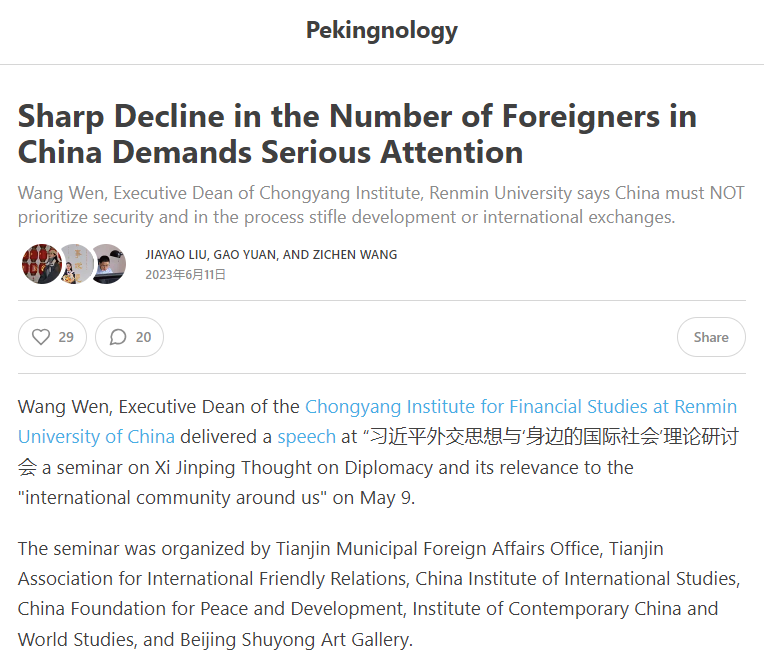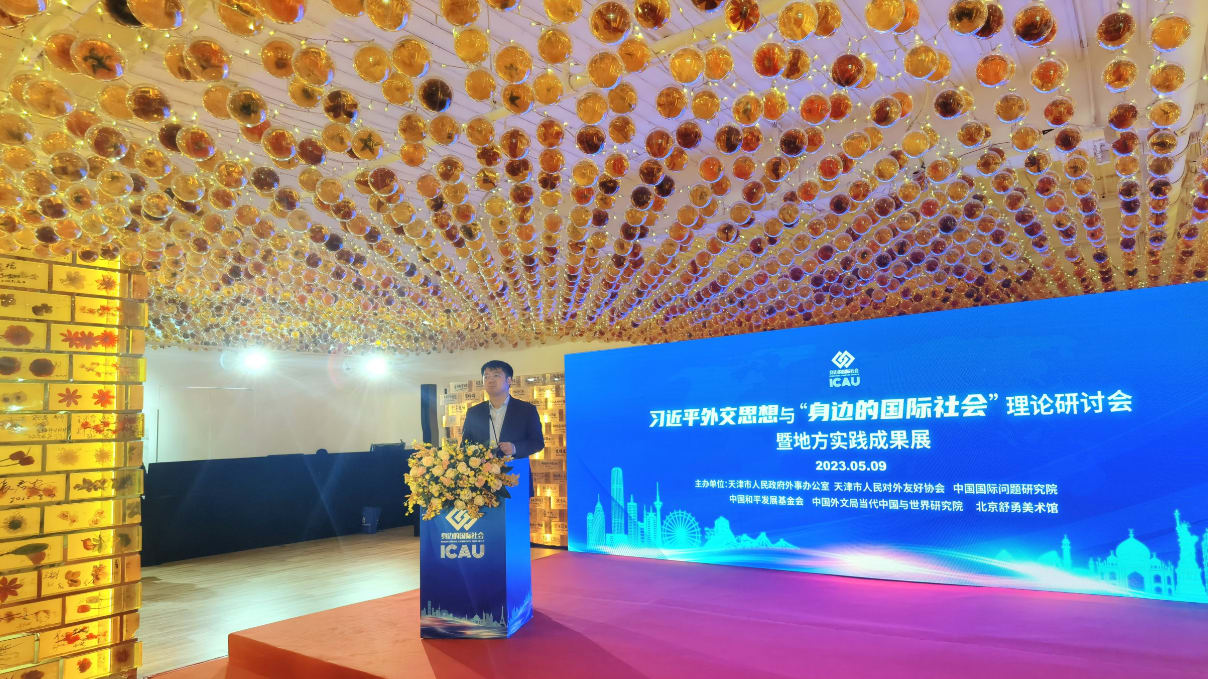LATEST INSIGHTS
Your Present Location: LATEST INSIGHTSWang Wen: Sharp Decline in the Number of Foreigners in China Demands Serious Attention
Source: Pekingnology Published: 2023-06-11

Wang Wen, Executive Dean of the Chongyang Institute for Financial Studies at Renmin University of China delivered a speech at “习近平外交思想与‘身边的国际社会’理论研讨会 a seminar on Xi Jinping Thought on Diplomacy and its relevance to the "international community around us" on May 9.
The seminar was organized by Tianjin Municipal Foreign Affairs Office, Tianjin Association for International Friendly Relations, China Institute of International Studies, China Foundation for Peace and Development, Institute of Contemporary China and World Studies, and Beijing Shuyong Art Gallery.
Wang, a Global Times editor turned opinion leader in China, warned against sharply declining foreigners in China and, called for, in his words, amid General Secretary Xi Jinping's continuous call for "comprehensive opening up to the outside world" and the central government's emphasis on openness to reflect on and remind the Chinese government at all levels to pay attention to the specifics of their policies regarding international exchanges.
Below is a condensed version of his speech “老外”在中国急剧减少!这一趋势须高度重视 Sharp Decline in the Number of "Foreigners" in China! This Trend Demands High Attention and is not a full translation. All emphasis is mine. - Zichen
While the term "international community" may sound sophisticated, it exists right within our own society. Through social media platforms like WeChat, Chinese individuals can engage with a diverse range of foreigners, including diplomats, foreign journalists, businesspeople, international students, and overseas Chinese. These daily interactions, such as likes, comments, and conversations, contribute to the formation of an "international community around us." This community has significant influence over the number of long-term foreign elites residing in China and their integration into Chinese society. Moreover, it plays a vital role in shaping China's relationship with the rest of the world, particularly developed nations, and can contribute to resolving existing tensions.
One crucial challenge that China faces is the insufficient infrastructure to fully leverage the potential of the "international community around us." To establish and strengthen this community and propel China's global influence, breakthroughs and expansion in infrastructure are necessary. This includes developing and enlarging various institutional frameworks related to finance, business, and management. Looking ahead, attracting more global talents and foreign elites is vital for China to become a socialist modernized strong nation.
Furthermore, there is a significant disparity between China's global power status and the current quantity and quality of foreign residents and talents in the country. This disparity raises concerns. On one hand, statistics indicate an overall increase in the number of foreigners in China, but there has been a notable decrease in individuals from developed countries.
According to the seventh national census, the number of long-term residents from developed countries in China showed varying degrees of decline from 2010 to 2020. For example, the number of French citizens residing in mainland China decreased by about 40%, from 15,087 to 9,196. The number of Americans decreased by 23%, from 71,000 to 55,000. The number of German, Italian, and Japanese citizens residing in China has also declined.
As China's most internationalized city, Shanghai experienced a decrease in the number of foreigners from 208,000 in 2011 to 163,000 in 2021. I reside in Beijing's Wangjing Street, a relatively internationalized neighborhood. Ten years ago, nearly 100,000 Koreans were living in Wangjing, but now the number may be only 20,000. The proportion of foreign residents in China is approximately 0.05%, which is significantly low for the world's second-largest economy. It lags behind the percentages in Japan and South Korea, both of which have over 2% of foreign residents. It is even lower than countries like Laos (approximately 0.8%) and Cambodia (approximately 0.5%).
In general, top-tier talents tend to come from developed countries, but the fastest-growing segment of foreign residents in China consists of individuals from developing nations. However, the challenge of effectively accommodating and retaining high-caliber global talents in the long term remains unresolved in China.
The decline in the number of residents from developed countries in China over the past few years can be attributed to various factors, such as the impact of the COVID-19 pandemic and the intensification of the Sino-US competition. However, another significant factor often goes unmentioned: the actual implementation of China's policies and the social-cultural environment still have room for improvement to effectively accommodate foreigners. In light of this, four suggestions are in order to attract a greater number of high-caliber foreign talents.
Firstly, efforts should continue to attract foreign investment and enhance the business environment, ensuring a rapid influx of foreign capital. The rapid increase in foreign investment is crucial for domestic development prospects and countering Western containment. Central and local governments need to address foreign investment access in areas such as tariff barriers, banking and finance, postal services, securities and insurance, construction and tourism, education, and telecommunications.
Secondly, fostering social acceptance and cultural inclusiveness towards foreigners is essential. Regrettably, derogatory comments about foreigners can be found in Chinese public discourse, contradicting China's traditional values of inclusivity and failing to showcase the confidence of a great nation. Particularly in the context of escalating competition between China and the West, approaching foreign individuals, especially those from Western countries, with a fair and balanced mindset is crucial. Treating foreigners equitably based on law rather than cultural biases or social prejudices is a fundamental value for citizens of a modern great nation.
Thirdly, guaranteeing quick and convenient procedures for foreigners in various areas, such as finance and taxation, residence, tourism, and daily life, is crucial. Foreign students, workers, and long-term residents coming to China should receive equal treatment as Chinese citizens, including simplified processes for registering WeChat and Alipay accounts, obtaining credit cards, and accessing social security, medical insurance, and pension. These procedures should be streamlined to ensure convenience and efficiency for foreigners settling in China.
The key to "coordinating security and development" is to promote development while ensuring overall security. It is crucial to maintain overall security while continuously advancing rapid development. An important criterion for testing local governance is if it does NOT prioritize security and in the process stifle development or international exchanges.
Lastly, reforms and innovations can be promoted in China's approval process for intellectual exchanges with foreign countries. Exploring interactions between China's intellectual community and foreign scholars, businesses, embassies, media, and related individuals for greater flexibility can transition from a pre-approval system to a post-reporting system. Requiring pre-approval for every interaction can impede academic and exchange activities, potentially tarnishing China's international image.
Against the backdrop of General Secretary Xi Jinping's continuous call for "comprehensive opening up to the outside world" and the central government's emphasis on openness, it is necessary to reflect on and remind the Chinese government at all levels to pay attention to the specifics of their policies regarding international exchanges. The devil is in the details, as they determine the success or failure and the actual outcome of China's interactions with foreign countries and the construction of the "international community around us."
Amidst ongoing reports in overseas public opinion suggesting a decrease in the number of long-term residents from developed countries in China and claims of China's lack of accommodation towards foreigners or inconvenience in traveling within the country, it is essential to reflect on these issues and ensure that the implementation of policies aligns with the goals of openness and fosters positive international interactions.
























































































 京公网安备 11010802037854号
京公网安备 11010802037854号





